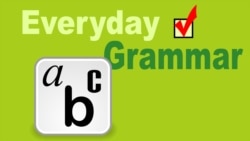In the country of Japan, being told that your face is small is very high praise for a woman. In Russia, if someone tells you that you look like a cucumber, it means that you look healthy and fresh. And if someone calls you an old pot in Cameroon, it means you are a wonderful cook.
All of these are examples of compliments – words of praise.
And, as you can see, there are differences among places and cultures about what is believed to be complimentary. But most people agree that giving a compliment is a nice thing to do.
In today’s program, we’ll show you some common language Americans use to give compliments.
Appearance
Let’s break the discussion into three sections: appearance, abilities and possessions.
We will begin with appearance. This includes the way a person looks, the clothes they wear and their hairstyle.
You may have already used some of these common language structures for praising someone’s appearance. Others may be new. For example:
- You are / look + adjective
...as in “You are beautiful” and “You look great today!”
- A closely related structure simply adds a noun
…as in “You are a beautiful person"
In fact, this structure is also common for praising someone’s abilities, as I will return to shortly.
Other common structures for complimenting appearance are:
- I like / love + noun
…as in “I love that bag!” and “I really like your hair.”
- And: What a + adjective + noun
…as in “What a fun tie!” and “What a pretty dress!”
Listen to a short exchange:
Ooh, what a fun tie! Where did you get it?
Oh, thank you! I got it at a shop on 14th Street.
Abilities
We can also compliment someone’s character, abilities or efforts.
Here’s a structure you heard earlier:
- You are + adjective + noun
…as in ”You are such a hard worker” and “You really are an amazing cook!”
Note that I added the words “such” and “really.” These adverbs and others, like “very” and “so,” can add strength to compliments.
- Next is: You can really + verb
…as in “Wow, you can really sing!”
- You are great at + noun / gerund
…as in “You’re great at bringing people together” and “You’re great at math.”
- And: You make a / an + adjective + noun
…as in “You make a fine leader” and “You make a very loving partner.”
Listen to a short exchange:
I’m meeting so many interesting people. Sam, you’re great at bringing people together.
That’s a nice thing to say. Thanks! And I’m glad you’re here.
Possessions
Americans also compliment people on their possessions, such as a person’s home (or things inside the home), car, bike, electronics or countless other possessions. We might offer the compliment in any of these ways:
- Nice + noun
…as in “Nice bike!” and “Nice phone!”
- I love / like your + noun
…as in “I like your dining set” and “I love this painting.”
- Or: What a + adjective + noun
…as in “What a beautiful home” or “What a beautiful home you have.”
Listen to a short exchange:
What a beautiful home you have! How long have you lived here?
Oh, thank you! For about three years now.
Receiving compliments
Some people may feel uneasy receiving attention and may deny the compliment in some way. But many receive them easily. A simple “Thank you” with a smile is a gracious way to answer a compliment.
You can also compliment in return by saying, “That’s very kind of you” “How nice of you” or “What a nice thing to say.”
Be sincere
Depending on the social customs where you live, some compliments may be not be received as such. And sometimes, they shouldn’t be. People can make backhanded, inappropriate or insincere comments that they try to pass as compliments.
A “backhanded compliment” is one that may be meant or understood as an insult. Someone might say, for instance, “You look great. Wow, I didn’t recognize you!” This can suggest that the compliment-giver thinks the person rarely looks great.
Other compliments are considered unacceptable. For example, in the U.S., it is often inappropriate to comment on physical appearance in the workplace. This is especially true when a man comments on a woman’s appearance. But it is acceptable for people to compliment each other at work about work.
Another kind of praise is flattery – excessive compliments that are often given in self-interest. An example is praising your supervisor or professor in hopes of gaining better pay or grades. It might work on some people but insincerity can be hard to hide.
So it's always best to follow the first rule of giving compliments: Always be sincere!
I’m Alice Bryant.
Alice Bryant wrote this story for Learning English. Caty Weaver was the editor.
______________________________________________________________
Practice
1 - Did you know that World Compliment Day is March 1, 2019? We celebrate by giving compliments to friends, coworkers, family and others. Who are some people you would like to give compliments to? Here’s my contribution: You are such a good listener! And your English is impressive.
2 - What are some compliments you have received about your appearance, abilities and/or possessions?
3 - In American culture, if someone uses the expression, “You look like a million bucks,” it is a very high compliment on physical appearance. It means you look amazing. (“Bucks” is an informal word for dollars.) What are some common expressions that are compliments in your culture?
______________________________________________________________
Words in This Story
cucumber – n. a long vegetable with dark green skin that is often used in salads or for making pickles
pot – n. a deep, round container that is used for cooking
tie – n. a long piece of cloth that is worn by men around the neck and that is tied in front with a knot at the top
character – n. the way someone thinks, feels, and behaves
gerund – n. an English noun formed from a verb by adding -ing
gracious – adj. very polite in a way that shows respect
insincere – adj. not having or showing true feelings that are expressed in an honest way
insult – n. to do or say something that is offensive to someone
grade – n. a number or letter that indicates how a student performed in a class or on a test







